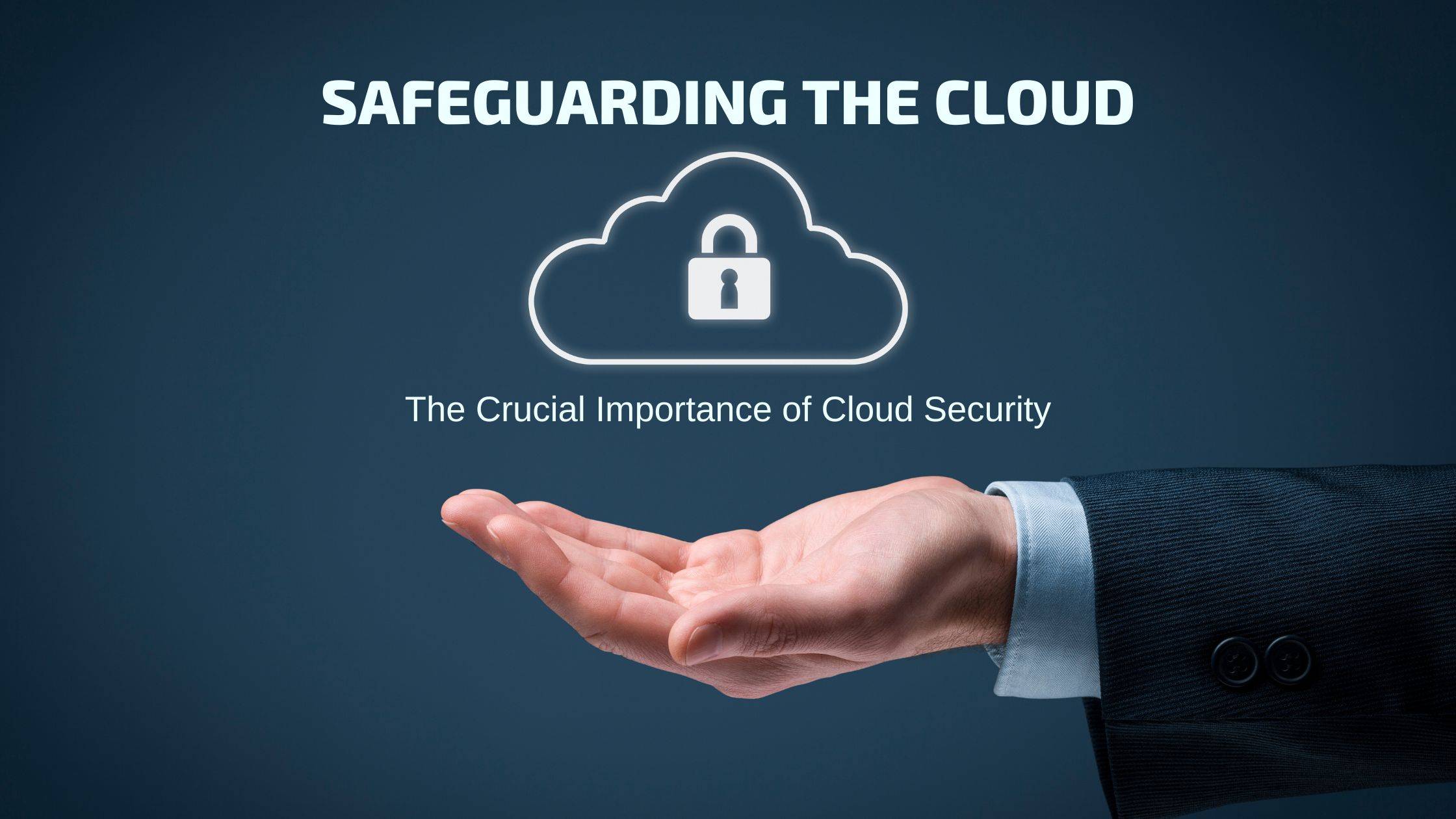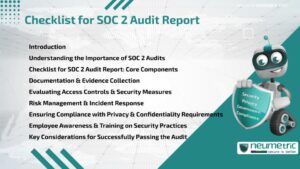Table of Contents
ToggleSafeguarding the Cloud: The Crucial Importance of Cloud Security
Introduction
Cloud Security refers to the set of practices, technologies & policies implemented to safeguard data, applications & resources in cloud computing environments. It addresses the unique challenges that arise from the dynamic nature of cloud services, where data is stored & processed on remote servers accessible over the internet. Cloud Security encompasses various aspects, such as data protection, Identity & Access Management [IAM], network security & compliance measures. By ensuring data Confidentiality, Integrity & Availability [CIA], Cloud Security aims to mitigate potential risks & vulnerabilities, providing organisations with a safe & secure cloud computing experience.
In the digital age, where businesses rely heavily on cloud services for data storage, application hosting & seamless collaboration, the significance of Cloud Security cannot be overstated. The rapid increase in cloud computing has revolutionised the way organisations operate, offering unparalleled scalability & cost-efficiency. However, this digital transformation also exposes businesses to new cybersecurity threats & challenges.
The increasing number of data breaches, cyber-attacks & malicious activities targeting cloud environments underscores the critical need for robust Cloud Security measures. It is imperative for organisations to adopt proactive strategies & best practices to protect their sensitive information, maintain regulatory compliance & build trust with their customers in an ever-evolving cyber landscape.
This Journal aims to shed light on the crucial importance of Cloud Security & its role in the modern digital landscape. By delving into various aspects of Cloud Security, such as data protection, regulatory compliance, threat mitigation & emerging trends, we seek to emphasise the significance of secure cloud practices. Understanding the risks & vulnerabilities associated with cloud computing & the measures required to address them will enable businesses to make informed decisions & implement effective security measures. Our focus is to provide valuable insights & actionable strategies to help organisations fortify their cloud environments, safeguard their assets & navigate the complexities of Cloud Security with confidence.
Data Protection & Confidentiality
Storing data in the cloud introduces inherent risks, including unauthorised access, data breaches & data loss. These risks arise due to factors such as shared infrastructure, complex data flows & potential vulnerabilities in Cloud Service Provider’s [CSP’s] systems. Understanding these risks is vital for organisations to develop comprehensive security strategies.
To safeguard data privacy & confidentiality, organisations must implement robust measures. This includes employing encryption techniques to protect data both in transit & at rest, implementing access controls to limit unauthorised access & utilising secure transmission protocols to prevent eavesdropping & tampering. Encryption serves as a critical tool in Cloud Security, rendering data unreadable to unauthorised individuals or systems.
Regulatory Compliance
Regulatory compliance ensures businesses follow relevant laws & standards, including data protection regulations like European Union’s General Data Protection Regulation [EU GDPR], the Health Insurance Portability & Accountability Act [HIPAA] & other industry-specific compliance frameworks. GDPR safeguards EU citizen’s personal data with strict requirements, while HIPAA protects medical data in the US. Adherence to these regulations is crucial for maintaining customer trust & data security.
Regulatory compliance is crucial to maintaining ethical practices & operating within the law. Non-compliance can result in hefty fines, damaged reputation, lawsuits & even licence suspension. Businesses must prioritise compliance efforts & implement strong internal controls to avoid these consequences.
Understanding the potential consequences reinforces the urgency of maintaining Cloud Security measures to meet compliance requirements. Cloud Security plays a pivotal role in meeting regulatory compliance requirements. Organisations need to implement robust security controls, conduct regular audits & maintain detailed records to demonstrate adherence to data protection regulations.
Business Continuity & Disaster Recovery
Maintaining the availability & resilience of cloud services is crucial for uninterrupted business operations. Strategies such as redundancy, load balancing & failover mechanisms must be implemented to minimise service disruptions & ensure business continuity in the face of unexpected incidents. Data loss can occur due to various factors, including hardware failures, human errors or malicious activities. Robust backup & recovery strategies are essential in Cloud Security. This necessitates implementing regular data backups, off-site storage & periodic testing of recovery procedures to ensure data integrity & quick recovery in the event of an incident.
Disruptions & downtime can significantly impact business operations. Proactive measures to mitigate the impact, such as incident response planning, real-time monitoring & rapid incident detection must be implemented. By implementing these measures, organisations can minimise downtime, reduce financial losses & maintain customer confidence.
Threat Mitigation & Cybersecurity
Cloud environments are susceptible to various threats, including malware attacks, data breaches, insider threats & Distributed Denial-of-Service [DDoS] attacks. To mitigate Cloud Security threats, organisations must adopt a multi-layered approach. This includes implementing strong network security controls, conducting regular vulnerability assessments & penetration testing & educating employees about security best practices.
Threat mitigation & cybersecurity are essential for cloud security. Timely detection & effective incident response play a crucial role in identifying & addressing potential threats promptly. By investing in skilled professionals & utilising automated tools, organisations can effectively minimise the impact of security breaches & protect sensitive data.
Scalability & Flexibility
Cloud security enables business scalability by providing a flexible and secure framework. However, ensuring security during the scaling process is paramount. It allows businesses to easily scale resources based on demand, ensuring optimal performance and cost efficiency. Additionally, cloud security services protect against cyber threats, ensuring uninterrupted operations as businesses adapt and grow in dynamic markets.
Scalability and flexibility are essential in cloud computing, enabling resource adjustments to meet varying demands. However, security must be a top priority during cloud resource scaling. Proper access controls, encryption, and monitoring are vital to protect sensitive data. Regular security assessments are necessary to address vulnerabilities and maintain a strong balance between scalability and security.
The cloud enables secure remote access & flexible work environments, especially in today’s digital landscape. Secure Virtual Private Networks [VPNs], Multi-Factor Authentication [MFA] & Endpoint Security Solutions must be implemented to ensure data confidentiality & integrity in remote access scenarios.
Trust & Reputation
Customer trust is vital for organisations operating in the cloud. Robust Cloud Security measures must be implemented to contribute to building customer trust. It emphasises the importance of transparent security practices, compliance certifications & effective communication regarding data protection to foster trust with customers.
Security incidents can significantly impact an organisation’s reputation and trust. Data breaches and cyber-attacks can lead to negative publicity, loss of customer confidence, and decreased business opportunities. Prioritising cybersecurity and having strong incident response plans is crucial to safeguarding reputation and trust.
Trust and reputation are crucial in cloud security. A competitive advantage can be gained through strict compliance with regulations, robust data encryption, proactive threat detection, and transparent data handling. Building trust with customers and prioritising security measures attracts more clients and fosters long-term relationships.
Cost Efficiency & Risk Reduction
Security breaches & data loss can have significant financial implications for organisations. The potential costs associated with security incidents, including remediation efforts, legal actions, regulatory fines & the impact of reputational damage on business revenue must be considered.
Investing in robust Cloud Security measures can yield cost-saving benefits in the long run. Proactive security measures, such as vulnerability management, incident response planning & employee training, can help minimise financial losses & reduce the overall cost of security incidents. Proactive Cloud Security measures are essential for mitigating risks. Regular security assessments, security awareness training & incident response planning are important to identify vulnerabilities, reduce the likelihood of security incidents & effectively mitigate risks.
Emerging Trends & Considerations
- Evolving challenges & emerging technologies in Cloud Security: The field of Cloud Security is continually evolving, presenting new challenges & opportunities. There exists emerging challenges, such as Advanced Persistent Threats [APTs], cloud-native security risks & regulatory updates. It also highlights emerging technologies, including cloud-native security solutions, threat intelligence platforms & security automation, that can help organisations address these challenges effectively.
- Integration of Artificial Intelligence [AI] & Machine Learning [ML] in Cloud Security: AI & ML have significant potential in enhancing Cloud Security. AI & ML can be leveraged for threat detection, anomaly detection, behaviour analysis & automated incident response in the cloud. It emphasises the advantages & considerations of integrating these technologies into Cloud Security frameworks.
Cloud environments require continuous monitoring & adaptation to keep pace with evolving threats & vulnerabilities. Real-time security monitoring, log analysis, threat intelligence feeds & adaptive security strategies are important to detect, respond & adapt to emerging risks effectively.
Conclusion
In conclusion, the importance of Cloud Security cannot be overstated. Throughout this Journal, we have highlighted how Cloud Security measures are essential to protect sensitive data, maintain regulatory compliance & mitigate potential threats in the dynamic cloud computing landscape. The risks posed by cyber threats & data breaches emphasise the urgency for organisations to take proactive steps to secure their cloud environments.
We strongly urge organisations to prioritise & invest in robust Cloud Security measures. As businesses increasingly rely on cloud services for critical operations, it is vital to implement comprehensive security strategies that encompass data protection, IAM, network security & compliance. By allocating resources & efforts to Cloud Security, organisations can build a strong defence against cyber threats & safeguard their valuable assets & reputation.
As cloud technologies continue to evolve, so do the threats & challenges they present. Embracing a proactive & adaptive approach to Cloud Security is crucial to stay ahead of emerging risks & protect against potential disruptions. By acknowledging the significance of Cloud Security & integrating it into every aspect of cloud adoption & operation, organisations can confidently embrace the boundless opportunities offered by cloud computing while ensuring the safety & integrity of their digital assets. Let us embark on this journey of secure cloud computing, shaping a resilient & secure future in the ever-expanding digital landscape.
FAQs
What are the different types of security in the cloud?
In the cloud, various types of security measures are employed to safeguard data & resources. These include data security, which involves encrypting & protecting sensitive information; Identity & Access Management [IAM], which controls user access & authentication; network security, which safeguards data traffic with firewalls & Intrusion Detection Systems [IDSs]; application security, focusing on securing cloud-based applications through coding practices & testing; & cloud provider security, which relies on the security practices of the chosen cloud service provider. Together, these measures ensure comprehensive protection against unauthorised access, data breaches & other cybersecurity threats in the cloud environment.
What are the 3 categories of Cloud Security?
The three categories of Cloud Security are Data Security, Identity & Access Management [IAM] & Compliance & Governance. Data security involves protecting sensitive information through encryption & access controls. IAM manages user identities, authentication & access to cloud resources using features like Multi-Factor Authentication [MFA] & Role-Based Access Controls [RBACs]. Compliance & Governance ensure adherence to regulatory requirements & internal policies in the cloud environment through practices such as auditing, logging & monitoring, maintaining data privacy & security.
What are the 4 types of cloud computing?
The four types of cloud computing are Public Cloud, Private Cloud, Hybrid Cloud & Community Cloud. Public Cloud provides services over the internet to multiple users & is managed by third-party providers. Private Cloud is dedicated to a single organisation & can be hosted on-premises or by a third-party provider. Hybrid Cloud combines both public & private cloud resources, allowing data & applications to move between them. Community Cloud is shared by multiple organisations with common interests, such as regulatory requirements or industry-specific needs. Each type offers distinct advantages & is chosen based on an organisation’s specific requirements & preferences.
What is a Cloud Security system?
A Cloud Security system refers to a comprehensive set of tools, policies & practices implemented to safeguard cloud computing environments from potential security threats & unauthorised access. It encompasses various security measures, including data encryption, Identity & Access Management [IAM], network security & application security, designed to protect data, applications & resources within the cloud. Cloud Security systems aim to ensure data Confidentiality, Integrity & Availability [CIA] while also addressing compliance requirements. These systems are essential for building trust & confidence in cloud services & providing organisations with the necessary safeguards to protect their sensitive information in the dynamic & ever-evolving cloud computing landscape.





